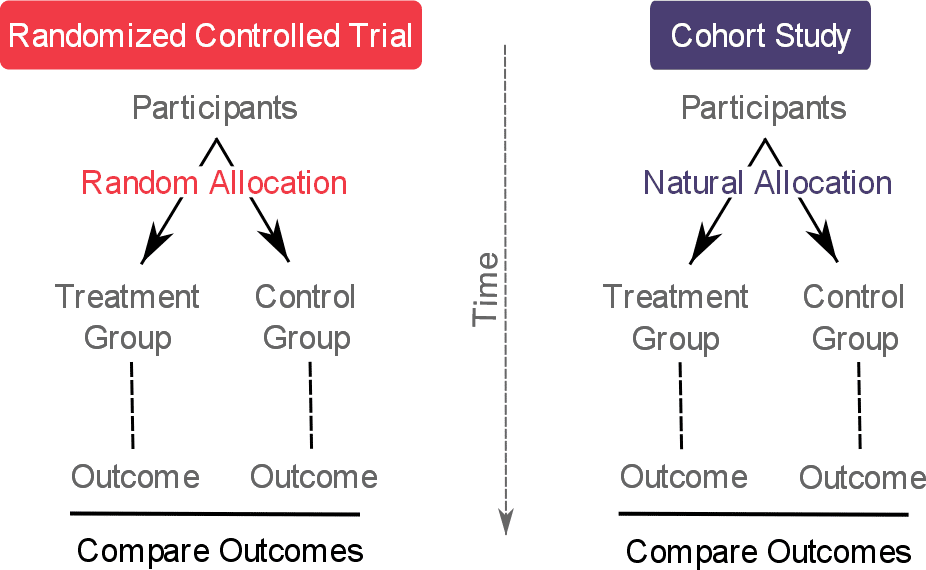A randomized controlled trial (RCT) is an experiment controlled by the researcher.
A cohort study is an observational study where the researcher observes the events and does not control them.
In short, If you want to prove a causal relationship between a treatment and an outcome, use a randomized controlled trial. If randomization is not ethical or possible, a cohort study is your second best option.
Similarities
Both studies compare a treatment group (in which participants receive the treatment of interest) to a control group (in which participants do not receive the treatment), and follow both groups in time to determine which one has a better/worse outcome.
Their goal is to examine the causal relationship between treatment and outcome.
Here’s a funny example from a TED Talk to illustrate the importance of using a control group:
I’ll show you an example of a bad idea:
[Shows the audience a piece of plastic with a Radio Shack antenna attached to it]This particular instrument was built to dowse for marijuana in students’ lockers!
Question:
Can it actually find marijuana in students’ lockers?And the answer is:
If you open enough of them, YES!In order to test this instrument, we had two opaque boxes: one with government-approved THC marijuana, and one with nothing in it.
Michael Shermer — Why people believe weird things (TED Talk)
And it got it 50 percent of the time — which is exactly what you’d expect with a coin-flip model.
In the experiment described in the last 2 lines of this example, the empty box represents the control.
Without control, it is impossible to prove whether the instrument works or not. It provided us with something to compare to.
This example shows the important role that a control group plays in both randomized controlled trials and cohort studies.
Differences
The main difference between a randomized controlled trial and a cohort study is whether or not the researcher uses randomization to allocate patients to the treatment and the control group.
The figure below illustrates the difference between a randomized controlled trial and a cohort:

In an RCT, participants are randomly allocated to either receive the treatment (or intervention, or prevention program) or not. The researcher will typically rely on a computer software to choose at random the group for each participant. For instance, when studying the effect of a new drug, we randomize people to either receive the new drug or a placebo (a substance that resembles the new drug but is inactive). and then we compare the outcome in each group in order to determine if the new treatment is better than the placebo.
In a cohort study, participants are NATURALLY divided into 2 groups: the treatment and the control. Here the researcher does not control who gets the treatment and who doesn’t.
A cohort will typically study an exposure to a certain factor rather than a treatment. Smoking is a good example: A cohort study can compare a group of smokers and a group of non-smokers.
With smoking as with other exposures to toxic substances and carcinogens, a randomized controlled trial will be highly unethical (imagine randomizing people to either smoke or not).
So as a rule of thumb:
An RCT is used to evaluate a treatment or prevention measure and a cohort is used to evaluate an exposure or the natural cause of a disease.
But, given the choice, medical researchers will always prefer an RCT over a cohort, if possible.
Why?
Suppose we conducted a cohort study to investigate whether coffee causes cancer or not , and the results of our cohort showed that the prevalence of cancer in the coffee drinking group was higher than the non-drinking group.
Does this mean that coffee causes cancer?
Well…
Suppose that people in the coffee drinking group tend to smoke more than the control group.
And because smoking is a known cause of cancer, the higher prevalence of cancer found in the coffee drinking group can be explained by the higher prevalence of smoking in this group — technically, we say that the relationship between coffee and cancer is confounded by smoking.
In contrast, a randomized controlled trial does not have such problems. This is because randomization eliminates bias and produces comparable groups.
(For more information check my other article: Purpose and Limitations of Random Assignment)
As such, an RCT provides the highest level of evidence for a causal relationship between a treatment and an outcome.